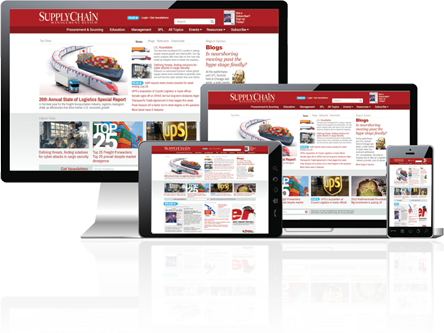The Half-Life of Supply Chain Knowledge
It hasn’t been true for decades that Westerners are the only ones living a middle-class lifestyle.
Latest News
Supply Chain Services acquires Dasco Label Automated storage and retrieval system (ASRS) market worth $10.7 billion by 2025 Trucking comeback: Dohrn Transfer turns the corner with assist from Pitt Ohio JSCM Video: Managing buyer-supplier conflicts JSCM Video: Managing buyer-supplier conflicts More NewsLatest Resource
Simplifying Your End-to-End Supply Chain Download this report highlighting each point on the supply chain journey by explaining the role it plays, which includes the pain points you may face, what you should be thinking about at a particular stage in the journey, and what technology you can benefit from.
Download this report highlighting each point on the supply chain journey by explaining the role it plays, which includes the pain points you may face, what you should be thinking about at a particular stage in the journey, and what technology you can benefit from.
All Resources
It has been a long time coming but the world is finally updating its perspective on trade and international relations for the first time since the Cold War ended.
Inter-governmental organizations that were once set up to benefit the United States and certain allies are no longer needed, and in the next 10-20 years we will see the new world order re-align these treaties and organizations and create new ones. Fifty years ago, when many of these organizations were created, 20-percent of the world had its basic needs met, and now that has risen to 80-90-percent. Yet the popular mentality of most Westerners is that 80-percent of the world is troubled and inferior in its institutions, lifestyle and affluence.
It hasn’t been true for decades that Westerners are the only ones living a middle-class lifestyle. Data from the United Nations and other sources shows that Westerners currently make up 60-percent while the “rest of the world” makes up 40-percent of the world’s middle-class population—percentages that will flip by 2040. Westerners are slow to the realization that we are losing our position of dominance, even though that’s a great thing overall for the rest of humanity.
Fritz Machlup came up with the idea of the “half-life of knowledge” being the time it takes for half of the knowledge about a subject to become obsolete. Supply chain managers still viewing the world through the lens of Cold War institutions like NATO and the United Nations are relying on knowledge that is well past its prime.
Probably one of the most important acts that a supply chain manager in the current uncertain environment could take would be to adopt a data-based approach to re-assessing global supply chains. Here are some pointers:
Be wary of what you read and watch in the media, especially when some public figures don’t hesitate to make statements that create fog and confusion.
Look at data on incomes, technological trends, and other hard data, and use them as the compass for your strategy.
Map out the key relationships for your company and any key political or stakeholder influencers and be realistic about who will really hold the power in the future. The odds are good that they won’t be from Europe or North America.
The world is changing rapidly, and the media is making it sound very scary and uncertain. Ballooning national debts have already led to defaults in a few Western countries and have left countries – such as the United States – with no choice but to reconsider how public expenditure is spent. Supply Chain managers need to monitor these shifts closely.

About the Author
 Michael Gravier
Michael Gravier is a Professor of Marketing and Supply Chain Management at Bryant University with a focus on logistics, supply chain management and strategy and international trade. Follow Bryant University on Facebook and Twitter.
Michael Gravier
Michael Gravier is a Professor of Marketing and Supply Chain Management at Bryant University with a focus on logistics, supply chain management and strategy and international trade. Follow Bryant University on Facebook and Twitter.

Subscribe to Supply Chain Management Review Magazine!
Subscribe today. Don't Miss Out!Get in-depth coverage from industry experts with proven techniques for cutting supply chain costs and case studies in supply chain best practices.
Start Your Subscription Today!
 Simplifying Your End-to-End Supply Chain
Download this report highlighting each point on the supply chain journey by explaining the role it plays, which includes the pain points you may face, what you should be thinking about at a particular stage in the journey, and what technology you can benefit from.
Download Today!
Simplifying Your End-to-End Supply Chain
Download this report highlighting each point on the supply chain journey by explaining the role it plays, which includes the pain points you may face, what you should be thinking about at a particular stage in the journey, and what technology you can benefit from.
Download Today!
 When COVID-19 was bringing other supply chains to a screeching halt, AGCO acted early and decisively to keep its operations around the world up and running. The key: A very agile supply chain.
When COVID-19 was bringing other supply chains to a screeching halt, AGCO acted early and decisively to keep its operations around the world up and running. The key: A very agile supply chain.
Supply Chain Management is not enough Risk Management in an Era of Extreme Uncertainty View More From this Issue
 Master Your Supply Chain with an Intelligent Control Tower
Today’s control towers provide powerful capabilities and real-time responsiveness with Autonomous Problem-Solving, Global Demand-Supply Matching and Global Available-to-Promise.
Register Today!
Master Your Supply Chain with an Intelligent Control Tower
Today’s control towers provide powerful capabilities and real-time responsiveness with Autonomous Problem-Solving, Global Demand-Supply Matching and Global Available-to-Promise.
Register Today!











